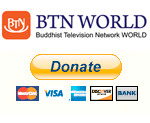
|
|
|
Home Asia Pacific North Asia S/N Korea News & Issues An American Buddhist monk in Koreaby Dale Quarrington, The Korea Times, Aug 1, 2011Seoul, South Korea -- When people think of a foreigner in Korea, they usually think of an English language teacher, a soldier or a professor. However, there are several people out there in the foreign community in Korea that contribute a lot more to Korean society than you might imagine.
To let you know a bit more about Chong Go Sunim, he’s an American Buddhist monk who has been living in Korea for the past 17 years. He had been practicing Buddhism in the U.S. for many years on his own; but according to him, he wasn’t making much progress. Eventually, he met and listened to the Korean monk Daehaeng Kun Sunim. And as he describes it, ``It was as if I’d been looking at a dirty painting, with only a small clean spot in the middle. When I began listening to Daehaeng Kun Sunim, it was as if the clean spot had suddenly become much larger and I could see what had been hidden. What she showed me seemed exactly what should have been there, but I had been unable to see it for myself.” Recently, I was fortunate enough to be allowed to ask him a few questions about what it’s like being an American living in Korea as a Buddhist monk. Here are the questions I asked him and their corresponding answers: Q: Tell me a little about yourself (i.e., where you're originally from, etc.) A: I'm originally from eastern Oregon and Washington. I lived and went to school there, until I came to Korea when I was 25. Q: When and how did you first become interested in Buddhism? A: I was probably about 12 when I first became interested in Buddhism, and one of the things that impressed me was the rock edicts of the Indian king, Ashoka. I don't remember exactly what he said, but he was encouraging people to treat each other well, and said that he who slanders another's religion slanders his own. There was a sense of inclusiveness that really impressed me. Q: What ideas/teachings of Buddhism would you say are the most important? A: Letting go of ``me" and ``mine," remembering that we're not the ones doing things and instead relying upon our inherent Buddha-nature, and not giving into the desire to blame or criticize others. The question is a bit like saying ``Which finger could you do without?" ``Umm, they're all kind of useful, actually." But these basic concepts are really huge, if someone diligently tries to apply them; they'll definitely see good results. Q: Why did you want to become a monk? A: Basically, I wanted to do the spiritual practice more than anything else. Q: Why did you decide to move to Korea? A: I was very impressed with the quality of monks and nuns from Korea, and the teacher I felt the most connection with also came from Korea. Q: Presently, what are you working on in Korea? A: As a part of my practice, I'm working with the Hanmaum International Culture Institute on translating the works of Seon Master Daehaeng. Q: What are your future plans? A: I'll probably get a cup of coffee, and then go have some dinner. So the next time you too narrowly or stereotypically think of what foreigners are doing in Korea, think of Chong Go Sunim and how they contribute in different ways to Korean society. Dale Quarrington has been living in South Korea, on and off, since 2003. He currently resides and teaches in Yangsan, South Gyeongsang Province. You can reach Dale at his blog: http://daleskoreantempleadventures.blogspot.com. |
 |
|
| Korean Buddhist News from BTN (Korean Language) |
|
 |
|
|
Please help keep the Buddhist Channel going |
|
| Point
your feed reader to this location |
|



